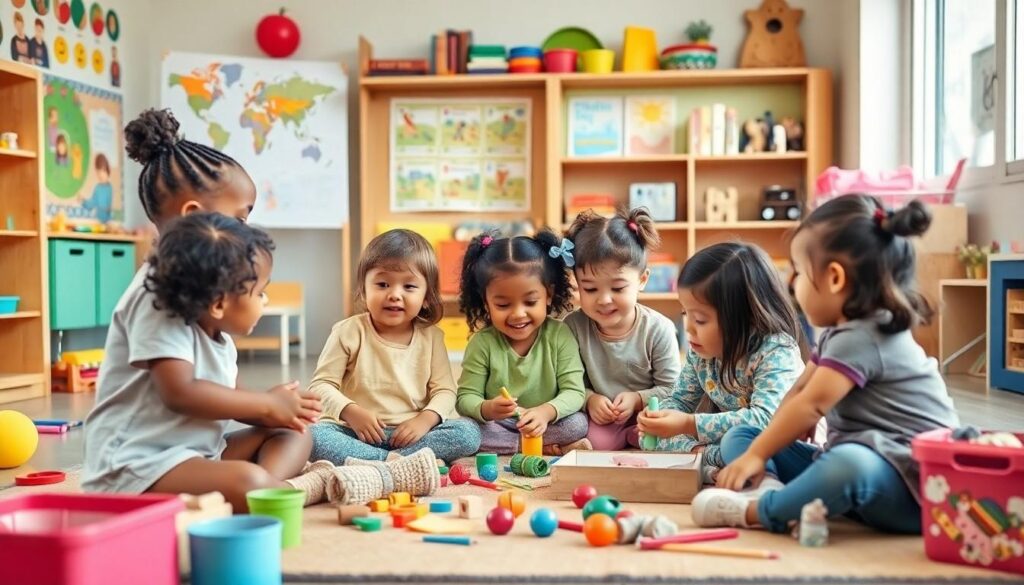In the heart of the Midwest, Indiana isn’t just famous for its basketball and cornfields; it’s also paving the way for early childhood education with its Early Learning Standards. These guidelines are like the GPS for young learners, helping them navigate through the exciting world of discovery and development. Imagine a roadmap that not only points the way but also makes the journey fun—because who said learning can’t be a blast?
Table of Contents
ToggleOverview of Indiana Early Learning Standards
Indiana Early Learning Standards provide a structured framework designed for children from birth to age 5. These standards focus on key development areas: physical health, social skills, emotional growth, cognitive development, and language acquisition. They offer educators and caregivers clear expectations to support children’s learning journeys.
By emphasizing play-based learning, the standards encourage exploration and creativity. Engaging with these standards enables children to grasp foundational concepts necessary for future academic success. Furthermore, they align with best practices in early childhood education, ensuring that learning experiences are meaningful and relevant.
Teachers can use the Indiana Early Learning Standards to create individualized lesson plans that adapt to diverse learning styles. Assessments based on these guidelines help track children’s progress, making it easier to identify strengths and areas for improvement. Families also benefit from understanding these standards, as they can support learning at home.
Resources available include training for educators, parent guides, and tools for implementing the standards effectively. Collaborating with local organizations enhances the educational environment, allowing for a community-centered approach to early childhood education. By prioritizing these standards, Indiana sets a high bar for quality education in early learning settings.
Key Components of the Standards

Indiana’s Early Learning Standards encompass several essential elements that ensure a comprehensive approach to early childhood education. Key components include practices that support children’s holistic development while addressing their specific learning needs.
Developmentally Appropriate Practices
Developmentally appropriate practices focus on meeting children where they are in their growth and learning journey. These practices emphasize child-centered approaches, allowing children to engage in hands-on activities that match their developmental stage. Collaboration among educators fosters environments where individual learning styles shine. Varied instructional strategies include both direct teaching and exploration. Continuous assessment informs planning, ensuring children progress at their own pace. Each child experiences a unique learning path, making this flexibility crucial for optimal growth.
Learning Domains
Learning domains define specific areas of development that the standards address. These domains include physical health, social-emotional growth, cognitive skills, and language development. Each domain plays a vital role in shaping a child’s overall learning experience. For example, physical health nurtures gross and fine motor skills while encouraging active play. Social-emotional growth supports relationship-building and self-regulation. Cognitive skills focus on critical thinking and problem-solving abilities. Language development encourages communication skills vital for future academic success. By covering these domains, Indiana’s Early Learning Standards guide educators in fostering well-rounded individuals.
Implementation in Early Childhood Settings
Indiana’s Early Learning Standards support effective implementation in early childhood settings through targeted training and resources.
Training for Educators
Educators receive training that focuses on practical applications of the Early Learning Standards. Workshops improve their understanding of child development and instructional strategies. Professional development opportunities ensure educators stay informed about current practices. These training sessions emphasize play-based learning and assessment techniques that engage children. Collaboration with experienced peers enhances skill-building, reinforcing the importance of community in educator growth. Additionally, ongoing support aligns educator practices with standards, fostering a consistent approach to teaching.
Resources for Families
Families benefit from various resources designed to support their role in children’s education. Parent guides provide insights into the Early Learning Standards and strategies for engaging children at home. Workshops host regular events that focus on early childhood development topics. Online resources offer interactive activities that reinforce learning through play. Community partnerships promote access to local programs that strengthen family involvement. By equipping families with knowledge and tools, Indiana fosters a collaborative environment for children’s growth and learning.
Benefits of Indiana Early Learning Standards
Indiana’s Early Learning Standards provide critical benefits for young learners, guiding them through a structured and enjoyable learning experience. These standards prioritize key areas of development, ensuring children receive well-rounded support.
Enhancing Child Development
Developmental growth stands as a primary benefit of Indiana’s Early Learning Standards. Frameworks target physical health, social-emotional skills, cognitive abilities, and language competencies. Activities align with children’s natural interests, promoting joyful exploration while aiding development. Learning environments foster creativity, allowing for hands-on experiences that respect individual growth rates. Teachers can tailor lessons to fit diverse needs, strengthening each child’s developmental path. Families participating in this process help reinforce learned skills at home, creating a consistent and supportive environment that nurtures growth.
Supporting School Readiness
School readiness represents another significant advantage of the Early Learning Standards. Curricula designed around the standards prepare children for academic success, facilitating essential skills for future learning. The focus on language acquisition ensures children can communicate effectively and express their ideas. Encouraging social skills builds collaborative abilities, vital for working with peers. Teacher assessments based on these standards help track progress and identify areas requiring additional support. Parents equipped with knowledge of these standards understand how to engage their children, enhancing readiness for the transition into formal education. Each of these elements collectively enhances children’s preparedness for school challenges.
Challenges and Considerations
Indiana’s Early Learning Standards face challenges that require careful consideration. Educators encounter diverse learner needs, necessitating flexibility in their approaches. Individualizing lessons ensures each child participates fully in activities that align with their developmental stage. Support systems, including targeted resources and training, help educators adapt to varied learning styles.
Evaluating the effectiveness of the standards remains critical for continuous improvement. Monitoring children’s progress through assessments allows educators to identify strengths and areas for growth. Regular feedback informs necessary adjustments in teaching methods and materials. Collaborations with families strengthen this evaluation process, enabling home support that mirrors classroom learning. Evaluations help maintain a high-quality educational experience, ensuring all children thrive in their early learning journey.
Indiana’s Early Learning Standards play a crucial role in shaping a positive educational landscape for young children. By promoting developmentally appropriate practices and emphasizing play-based learning, these standards ensure that children engage in meaningful exploration and growth. Educators are equipped with the tools needed to tailor instruction to diverse learning styles while families are empowered to support their children’s development at home.
The collaborative efforts among educators, families, and communities foster an environment where children can thrive. As Indiana continues to invest in early childhood education, the focus on these standards will undoubtedly pave the way for a brighter future, setting the foundation for lifelong learning and success.




